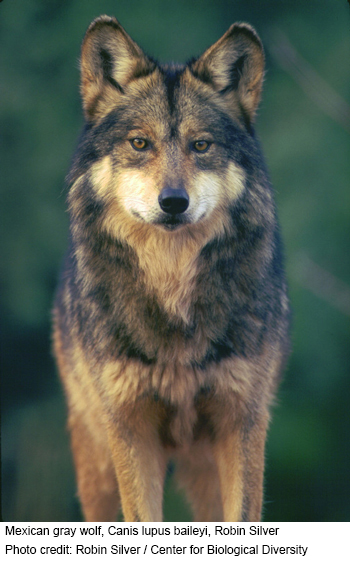December 11, 2022 - DENVER— Colorado Parks and Wildlife on Friday unveiled a draft restoration and management plan for wolves in the state. But the proposed plan allows for wolves to be killed  frequently and would let the state remove protections before a sustainable population is established.
frequently and would let the state remove protections before a sustainable population is established.
“This disappointing proposal doesn’t require ranchers to take responsibility for preventing conflicts and will lead to government agents regularly shooting Colorado wolves from helicopters,” said Michael Robinson, a senior conservation advocate at the Center for Biological Diversity. “The commissioners should reject this draft and rewrite the plan based on science. Colorado voters want wolves protected and not killed recklessly at the whim of special interests.”
While the wolf restoration and management plan was mandated by a 2020 citizens’ initiative approved by Colorado voters, the draft proposed on Friday was heavily influenced by stakeholders who opposed the initiative.
The draft plan would allow the killing of wolves without requiring ranchers to remove non-wolf-killed livestock. Such carcasses draw wolves into the vicinity of vulnerable living livestock. It would also allow wolves to be killed for preying on livestock on public lands, leaving wolves with no refuge.
Under the plan, the state would provide ranchers full payment for livestock confirmed to have been killed by wolves, even if the ranchers act negligently. This would create a financial incentive to suppress wolf populations. These policies would lead to more wolves being killed and more cost to Colorado taxpayers than if the state were to help ranchers undertake prevention measures to avoid livestock-wolf conflict.
The agency would also take wolves off the state endangered and threatened lists when they reach just 200 animals, a number too low to support genetic sustainability. During a Parks and Wildlife meeting on Friday, an agency official said this 200-wolf level had not been scientifically analyzed to check if it would allow wolves to remain genetically viable. Research that the Center has submitted to the agency in the past shows that the state needs at least 750 wolves to secure the species’ future in Colorado.
The plan also eschews science by rejecting the release of endangered Mexican gray wolves in southern Colorado. The Center has advocated that Mexican gray wolves be released in the San Juan Mountains to help rescue this genetically imperiled subspecies. Scientists have shown that three populations of Mexican wolves, including one in southern Colorado, are necessary for recovery.
Another agency official acknowledged on Friday that viability would depend on connectivity to wolves in other states. But Friday’s draft plan does not include such connectivity as a criterion for state delisting and potential wolf hunting.
“This plan paves the way for far too many wolves to be shot, even on public lands,” Robinson said. “To truly protect Colorado’s wolves, the state needs to focus on mandating conflict prevention, not writing checks after the fact.”
The state agency will hold required public hearings on this draft in January and February.
The Center for Biological Diversity is a national, nonprofit conservation organization with more than 1.7 million members and online activists dedicated to the protection of endangered species and wild places.
Source: Center for Biological Diversity
Photo credit: Robin Silver / Center for Biological Diversity








